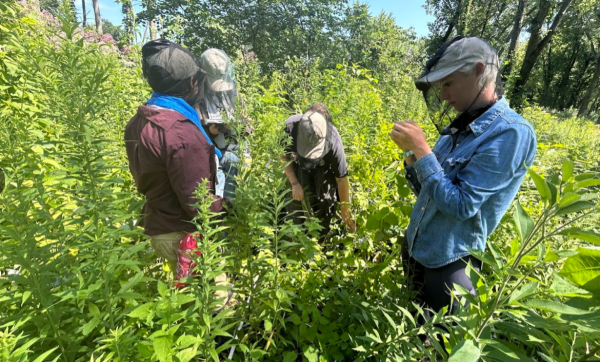
Adventures in Conservation – CLIP 2024 Week 7
by Emma Klein
Hello from TLC’s 2024 Summer CLIPsters! This week was hot and buggy! After a particularly wet weekend, the mosquitoes are now out in full force and are here to stay. We didn’t let that stop us, though, and kicked off the week with a full day of invasive control at Remington Grove. We used a combination of herbicide and hand pulling to eradicate the wild parsnip, Canada thistle, teasel and sweet clover that covered the area. Traversing the cattails with backpack sprayers was tough, but we’re tougher, and at the end of the day we treated ourselves to some Italian ice back at TLC headquarters.
On Tuesday we shifted gears and completed a stream biodiversity index survey with TLC Board Member Randy Schietzelt. Equipped with buckets, nets, and waders, we sampled the creek at Gateway Nature Park for fish and other invertebrates. The data gathered here was then used to calculate the estimated health of the stream, which can be indicative of other aquatic and terrestrial factors like nutrient buildup, drought or pollution. Luckily, our creek appears to be in good health, supporting a diverse array of fish species, like the Johnny Darter, Creek Chub and the Brook Stickleback.
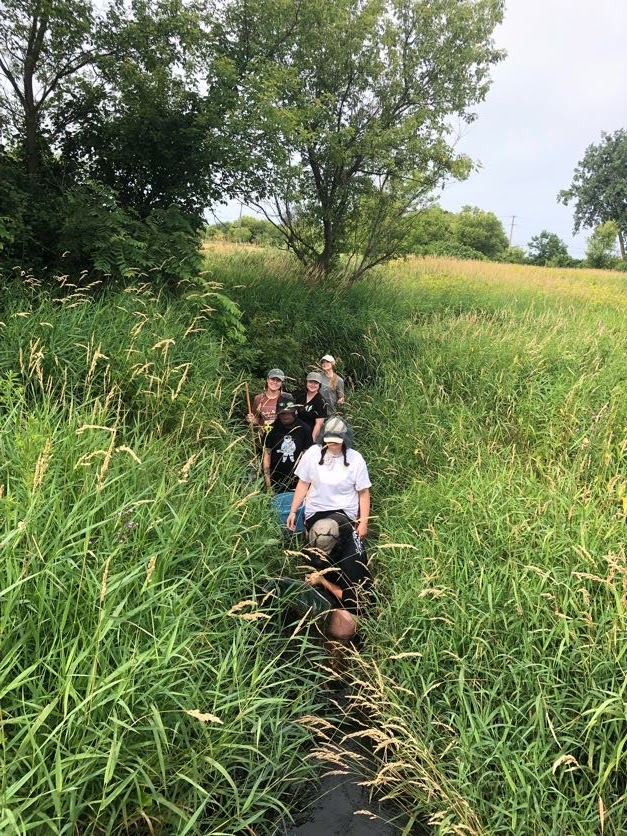
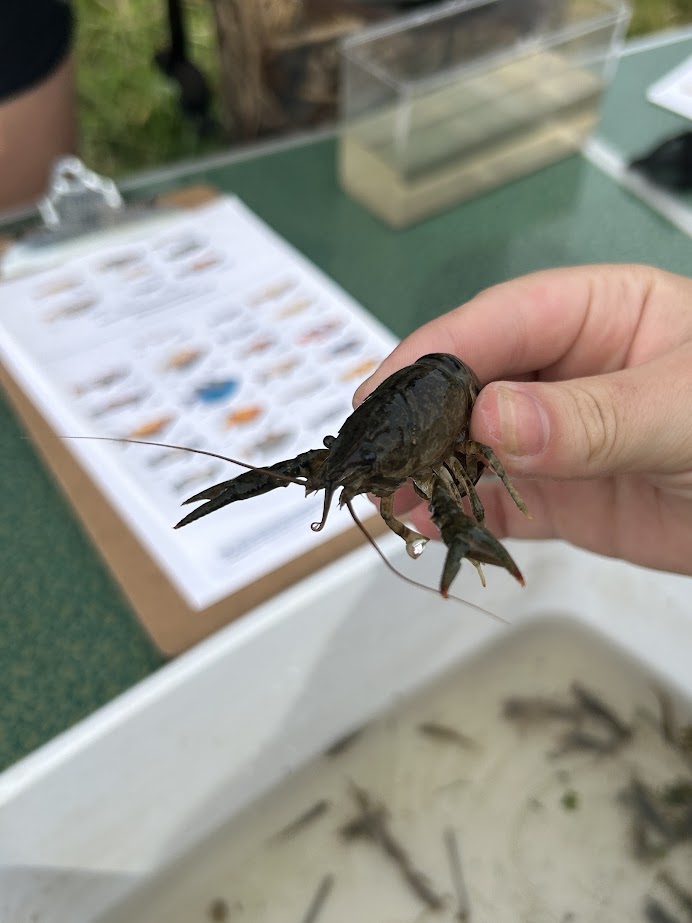
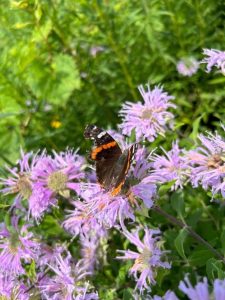 We continued our wildlife survey at Boloria Meadows, where volunteer Pete Jackson took us on a guided butterfly survey. Like freshwater fish, butterfly diversity is a great way to assess the health of an ecosystem. If a prairie lacks native host plants like milkweed, we would see less sensitive butterfly species. While our monitoring session was a bit too hot and windy for most butterflies, we were able to observe some Baltimore Checkerspots, Pearl Crescents and Black Swallowtails! We also managed to sneak some botanical identification into our walk, using field guides to identify Cream Gentian (Gentiana alba), Starry Campion (Silene stellata) and American Bellflower (Campanulastrum americanum). Improving our in-field plant identification skills will especially come in handy as we begin to conduct transect surveys later in the summer.
We continued our wildlife survey at Boloria Meadows, where volunteer Pete Jackson took us on a guided butterfly survey. Like freshwater fish, butterfly diversity is a great way to assess the health of an ecosystem. If a prairie lacks native host plants like milkweed, we would see less sensitive butterfly species. While our monitoring session was a bit too hot and windy for most butterflies, we were able to observe some Baltimore Checkerspots, Pearl Crescents and Black Swallowtails! We also managed to sneak some botanical identification into our walk, using field guides to identify Cream Gentian (Gentiana alba), Starry Campion (Silene stellata) and American Bellflower (Campanulastrum americanum). Improving our in-field plant identification skills will especially come in handy as we begin to conduct transect surveys later in the summer.
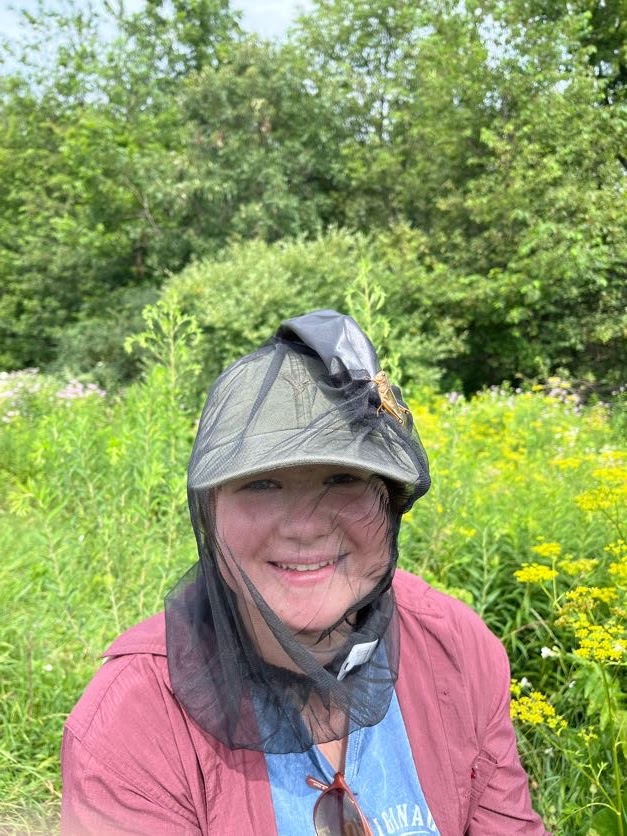
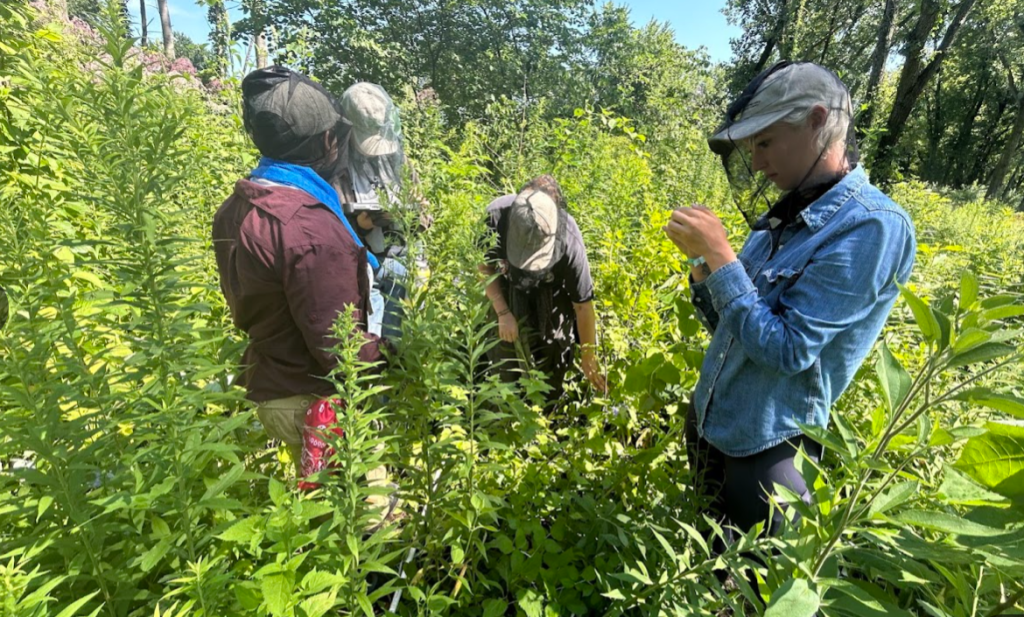
On Wednesday, it was back to invasive control, and we headed to Windy Knoll to cut Canada thistle, parsnip and sweet clover. After lunch, however, we were treated to a tour of McHenry County College’s many environmental programs. We had a short (but thorough!) tour of the native plantings surrounding MCC’s building, followed by a longer tour of MCC’s food gardens. This year, MCC’s agricultural program was able to produce certified organic crops like tomatoes, corn and lettuce. These crops can then be used within the college’s own cafeteria, and serve as great practice for students pursuing a career in agriculture. We also attended a quick seminar on floral design, where we arranged cut flowers from MCC’s garden. This was my personal highlight of the week; it’s great to capture some of the beauty we see every day in a single flower vase.
On Thursday, we spent the day with Jack and Judy Speer at Small Water Education in Harvard. Small Water specializes in permaculture-based ecology, and after a quick parsnip-pulling session, we got to learn about sustainable foraging. Jack and Judy’s property is lush and historic, and we had no problem finding an assortment of edible natives, such as wood sorrel (Oxalis acetosella), chokeberry (Aronia melanocarpa), and even pawpaw (Asimina triloba). Judy showed us the many medicinal and nutritional functions of the natives we work hard to protect, and reminded us to continually and openly communicate with the land that nourishes us.
On Friday, we finished the week the same way we started: invasive pulling! Irish Oaks has recently become overrun with parsnip, so we spent the day pulling adult snips and cutting seed heads. We took a much-needed lunch at Megan’s back porch and enjoyed more popsicles! Overall, it was an immensely productive and educational week.